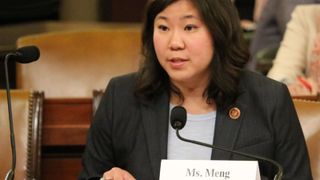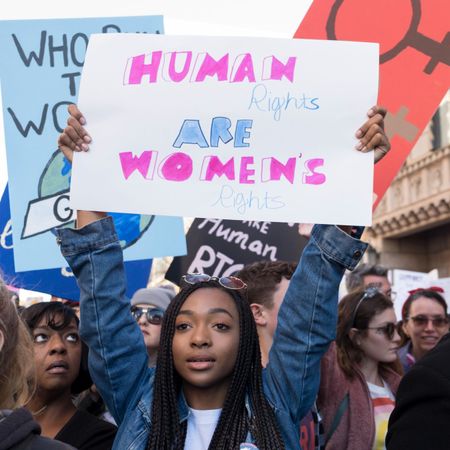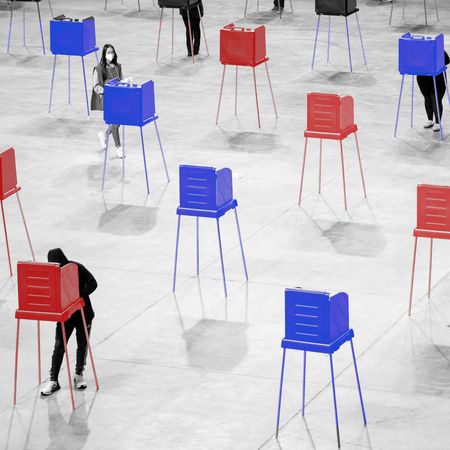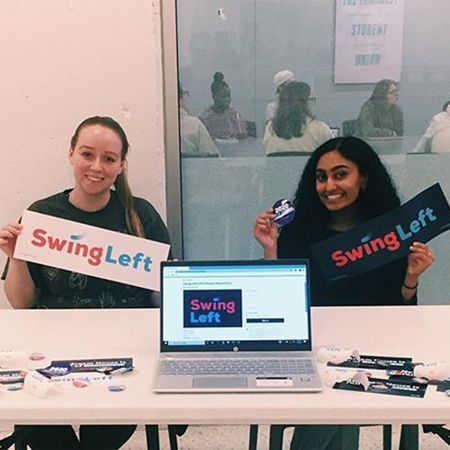Our Laws Period-Shame Women—So I'm Going to Change Them
An op-ed by Congresswoman Grace Meng.

Did you know that there are girls who skip school when they get their periods? If they can't afford pads or tampons and don't want anyone to see they've stained their clothes, they may feel like they have no choice. That's not just something that happens in developing countries. It happens right here in the United States. Right in my home district of Queens, New York.
I didn't know that until recently. Growing up, nobody talked about their periods, even if they were having problems; there was a certain taboo surrounding the issue. That all went out the window in 2015, the year "the period went public." Female elected officials and activists began to focus their attention on the tampon tax (which is a state issue); I turned my attention to how I could help women across the country.

'Congresswoman Grace Meng (D-NY) is the first politician to fight for menstrual equity at the national level
It was exciting to see coverage of the tampon tax pop up everywhere, including in Marie Claire. Last year, YouTube personality Ingrid Nilsen even asked President Obama about the tampon tax, and he was as mystified as the rest of us. But as great as the advocacy has been to eliminate sales tax on tampons and pads, menstrual equity issues run much deeper. Many women and girls across the country struggle with more than just cost, and I was constantly asking myself what I could do to help them.
Eliminating the tampon tax is not enough for the 86 percent of women who start their period unexpectedly without necessary supplies. It is not enough for the low income women who cannot afford menstrual products on their own and can only get them through food pantries. It is not enough for the female inmates and homeless women who are denied these products or have them rationed. Can you imagine being told you can't have any more pads even though you still have your period?
Most Americans—across all income levels—believe that feminine hygiene products are basic necessities. So why is it still so hard to afford and access them?
This week I introduced the Menstrual Equity for All Act of 2017, the first legislation in Congress to deal with menstrual hygiene product access. It has five different parts aimed at addressing all of these issues.
You would not believe what female inmates go through to access menstrual hygiene products. The ACLU of Michigan filed a federal lawsuit on behalf of 8 female prisoners at Muskegon County Jail because (among other things) the prison denied inmates access to menstrual hygiene products, a condition considered inhumane and degrading. Female inmates in Connecticut only get five pads per week to split with their bunkmate, which means they may have to use a single pad for multiple days. I cannot imagine how humiliating that must feel. My bill would require each state to give female inmates and detainees as many tampons or pads as they need, whenever they need them—at no cost. If Congress has to deny states certain federal funds to get their prisons to change their current horrendous practices, then so be it.
Stay In The Know
Get exclusive access to fashion and beauty trends, hot-off-the-press celebrity news, and more.

Congresswoman Grace Meng (D-NY) testifies before the House Ways and Means Committee regarding menstrual equity
Homeless women also face serious problems when on their period. A report issued in 2014 said that homeless women experience the "degrading condition of not having access to adequate facilities during their menstrual cycles to be able to use hygiene products and change them on a regular basis." Some homeless women resort to using rags or...nothing. Congress should be outraged by these conditions. Shelters should be able to use federal grant money to purchase tampons or pads—that is exactly what my bill ensures.
Once I started learning about all of the ways women and girls struggle to access menstrual hygiene products during their periods, I realized how much I took my own circumstances for granted. I am grateful to be in a position to advocate on this issue and effect change. My bill may be the first effort at addressing menstrual equity on the national stage, but it won't be the last. Especially not if passionate and talented women like you run for office and promote issues like these when you get there.
We cannot stop until we reach real menstrual equity for women and girls everywhere. Join me in this fight and, together, we can win.
Editor's Note: The Menstrual Equity for All Act of 2017 (H.R. 972) currently has 21 co-sponsors, all Democrats. Contact your representative to tell him or her to become a co-sponsor.
Follow Marie Claire on Facebook for the latest celeb news, beauty tips, fascinating reads, livestream video, and more.
-
 My Five Minute Lazy Girl Hair Routine Is The Key to Truly Excellent 2B Waves
My Five Minute Lazy Girl Hair Routine Is The Key to Truly Excellent 2B WavesRevealing my best-kept beauty secrets.
By Hannah Baxter Published
-
 Inside King Charles's "Special" and Personal New "Tribute" to Queen Elizabeth and the Queen Mother
Inside King Charles's "Special" and Personal New "Tribute" to Queen Elizabeth and the Queen MotherThe monarch is sharing elements of his childhood for a new generation to discover.
By Kristin Contino Published
-
 Michelle Williams Goes All-In on the Early-2000s Boho Aesthetic
Michelle Williams Goes All-In on the Early-2000s Boho AestheticAnother Chloé girl is born.
By Kelsey Stiegman Published
-
 36 Ways Women Still Aren't Equal to Men
36 Ways Women Still Aren't Equal to MenFeatures It's just one of the many ways women still aren't equal to men.
By Brooke Knappenberger Last updated
-
 What's at Stake in the 2022 Midterm Elections
What's at Stake in the 2022 Midterm ElectionsWith abortion rights, democracy, and many more critical issues on the ballot, there’s no room for apathy this election cycle.
By Rachel Epstein Published
-
 How New York's First Female Governor Plans to Fight for Women If Reelected
How New York's First Female Governor Plans to Fight for Women If ReelectedKathy Hochul twice came to power because men resigned amid sexual harassment scandals. Here, how she's leading differently.
By Emily Tisch Sussman Last updated
-
 Why the 2022 Midterm Elections Are So Critical
Why the 2022 Midterm Elections Are So CriticalAs we blaze through a highly charged midterm election season, Swing Left Executive Director Yasmin Radjy highlights rising stars who are fighting for women’s rights.
By Tanya Benedicto Klich Published
-
 Tammy Duckworth: 'I’m Mad as Hell' About the Lack of Federal Action on Gun Safety
Tammy Duckworth: 'I’m Mad as Hell' About the Lack of Federal Action on Gun SafetyThe Illinois Senator won't let the memory of the Highland Park shooting just fade away.
By Sen. Tammy Duckworth Published
-
 This Bill Wants to Stop Anti-Abortion Groups From Getting Your Private Data. Period
This Bill Wants to Stop Anti-Abortion Groups From Getting Your Private Data. PeriodPost-Roe period tracking apps and search history suddenly have serious implications.
By Emily Tisch Sussman Published
-
 Roe Is Gone. We Have to Keep Fighting.
Roe Is Gone. We Have to Keep Fighting.How To Democracy always offers a path forward even when we feel thrust into the past.
By Beth Silvers and Sarah Stewart Holland, hosts of Pantsuit Politics Podcast Published
-
 The Supreme Court's Mississippi Abortion Rights Case: What to Know
The Supreme Court's Mississippi Abortion Rights Case: What to KnowThe case could threaten Roe v. Wade.
By Megan DiTrolio Published